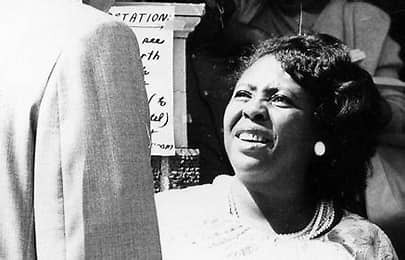Fannie Lou Hamer was a woman whose courage and conviction shook the foundations of American politics. Born into poverty and shaped by the harsh realities of Jim Crow Mississippi, Hamer rose to become one of the most powerful voices in the civil rights movement. Known for her fearless activism, unwavering Christian faith, and unforgettable words—“I’m sick and tired of being sick and tired”—Hamer became a symbol of grassroots democracy and the relentless struggle for human dignity.
Hamer was not a celebrity. She was not a lawyer or a preacher. She was a sharecropper—a working-class Black woman with little formal education. Yet, through the sheer force of her will and the clarity of her truth, she changed the course of history. Her story is a testament to the power of ordinary people to do extraordinary things when they are given the opportunity to speak, organize, and lead.
Early Life: Growing Up in Oppression
Fannie Lou Townsend was born on October 6, 1917, in Montgomery County, Mississippi, the youngest of 20 children in a family of sharecroppers. Her parents, James and Lou Ella Townsend, struggled daily under the weight of systemic racism and poverty. From a young age, Hamer labored in the fields, often picking cotton alongside her family for long hours with meager pay.
The economic exploitation of sharecropping—a system designed to keep Black families in a cycle of debt and dependence—combined with Mississippi's brutal racial caste system, shaped Hamer's early worldview. She received only a sixth-grade education before being pulled from school to work full-time.
Despite the hardships, Hamer developed a deep sense of justice and a strong Christian faith. She often led spirituals and prayers in her community, finding in religion both solace and a source of empowerment. Her voice, strong and soulful, would later become one of her most powerful tools in the civil rights movement.
Awakening to Activism
Hamer's political awakening came in 1962 when representatives from the Student Nonviolent Coordinating Committee (SNCC) visited Ruleville, Mississippi, to encourage Black residents to register to vote. At the time, Mississippi used literacy tests, poll taxes, and outright intimidation to suppress Black voter registration.
Hamer, then 44 years old, was inspired. She attended a SNCC meeting and volunteered to attempt to register to vote. On August 31, 1962, she boarded a bus with others and traveled to the county courthouse in Indianola. Her application was denied, and she was subjected to threats and retaliation.
When her white employer found out what she had done, he fired her from her job on the plantation. Hamer later recalled him saying, “If you don’t go down and withdraw your registration, you’ll have to leave.” Her response was simple and powerful: “I didn’t go down there to register for you. I went down to register for myself.”
That act of defiance cost her her job, her home, and nearly her life—but it also marked the beginning of her lifelong commitment to the fight for civil rights.
Brutality and Courage in Winona
In June 1963, Hamer and other activists were returning from a citizenship training in South Carolina when their bus was stopped in Winona, Mississippi. There, Hamer and several others were arrested and brutally beaten by police officers and inmates acting under orders.
She suffered permanent damage to her kidneys and eyesight, but she refused to be silenced. Instead, the beating fueled her determination. She later said, “I had to go back after I got out of jail, and I said I would go back if I had to go by myself. I would go back.”
This courage in the face of violence made Hamer a respected and inspiring leader in the civil rights movement. Her experience in Winona galvanized support from national organizations and leaders, including Dr. Martin Luther King Jr. and organizations like SNCC, CORE, and the NAACP.
Mississippi Freedom Democratic Party (MFDP): Challenging Power
Hamer’s most significant political impact came through the creation of the Mississippi Freedom Democratic Party (MFDP) in 1964. In a state where Black citizens made up nearly half the population but were systematically excluded from the political process, the MFDP aimed to challenge the legitimacy of Mississippi’s all-white Democratic delegation to the Democratic National Convention in Atlantic City.
As one of the party’s delegates, Hamer testified before the convention’s Credentials Committee in one of the most iconic speeches in American political history. Her testimony, broadcast live on television, detailed the abuse she had suffered for attempting to exercise her right to vote.
“All of this is on account of we want to register, to become first-class citizens... If the Freedom Democratic Party is not seated now, I question America.”
President Lyndon B. Johnson, fearing the political fallout from her testimony, hastily called a press conference to divert media attention. But Hamer’s words could not be ignored. Though the MFDP was offered a “compromise” of two non-voting seats—which Hamer and others rejected—the party’s challenge exposed the hypocrisy of American democracy on a national stage.
The moral power of her testimony shook the Democratic Party to its core and laid the groundwork for future reforms in the delegate selection process.
Beyond Voting: Fighting for Economic Justice
Hamer’s activism went far beyond voting rights. She understood that political rights without economic empowerment were incomplete. In the late 1960s, she turned her attention to fighting poverty and building Black self-sufficiency in the Mississippi Delta.
In 1969, she founded the Freedom Farm Cooperative (FFC)—a bold attempt to help Black families achieve economic independence through collective ownership of land and resources. With donations from supporters and allies, the cooperative purchased hundreds of acres where poor families could grow crops, raise livestock, and build homes.
FFC also launched a “pig bank,” where families were given pigs to breed and raise for food and income. The cooperative provided food security and jobs, showing that civil rights must include economic rights.
Hamer also worked to provide housing and education, founding a Head Start program and advocating for federal anti-poverty initiatives. Her vision was holistic—she wanted Black communities not just to vote, but to thrive.
Faith, Womanhood, and Revolutionary Love
Hamer’s activism was rooted in her faith. She saw the struggle for civil rights as a moral calling and often quoted scripture in her speeches. She sang spirituals not just as comfort, but as a form of protest and resistance.
As a Black woman, she defied the expectations of both white supremacy and patriarchy. In a movement often dominated by men, Hamer stood out not just for her eloquence and courage but for her insistence that women had a central role in the fight for freedom. She mentored young activists, encouraged women to speak out, and led by example.
Her revolutionary love—for her people, for justice, for the poor—was fierce and uncompromising. She rejected respectability politics and wasn’t afraid to call out injustice in all its forms, whether from white supremacists or liberal allies who tried to control or silence her.
Later Years and Death
Despite her national fame, Hamer never sought political office or wealth. She continued her work quietly in Mississippi, speaking at churches, organizing local initiatives, and supporting young activists.
In the 1970s, Hamer’s health began to decline due to complications from the Winona beating and ongoing battles with cancer and diabetes. She passed away on March 14, 1977, at the age of 59.
Her tombstone bears her famous quote: “I am sick and tired of being sick and tired.” But her life’s work was a declaration of hope, faith, and relentless resistance.
Legacy
Fannie Lou Hamer’s legacy is profound and far-reaching. She proved that one voice—no matter how marginalized—can shake the halls of power. She demonstrated that leadership does not require credentials or titles but courage, clarity, and love for your people.
Today, her influence can be felt in the movements for Black Lives, voting rights, food justice, and economic equity. Activists across the globe draw inspiration from her model of community-based organizing, intersectional justice, and moral resistance.
Hamer didn’t just challenge the system—she built alternatives. She didn’t just demand a seat at the table—she created new tables where everyone had a voice.
Conclusion
Fannie Lou Hamer was more than a civil rights icon—she was a spiritual and political force. In a world that often overlooks the contributions of poor Black women, she rose as a beacon of integrity, fearlessness, and love in action. Her life teaches us that true leadership rises from the ground up—and that lasting change begins when ordinary people decide to take a stand.
In honoring Fannie Lou Hamer, we honor the deep, often invisible roots of justice: the hands that pick cotton, the voices that testify, and the communities that dare to believe in something better. Her life reminds us that even in the darkest corners of oppression, the light of truth and courage can break through.




Share this page with your family and friends.